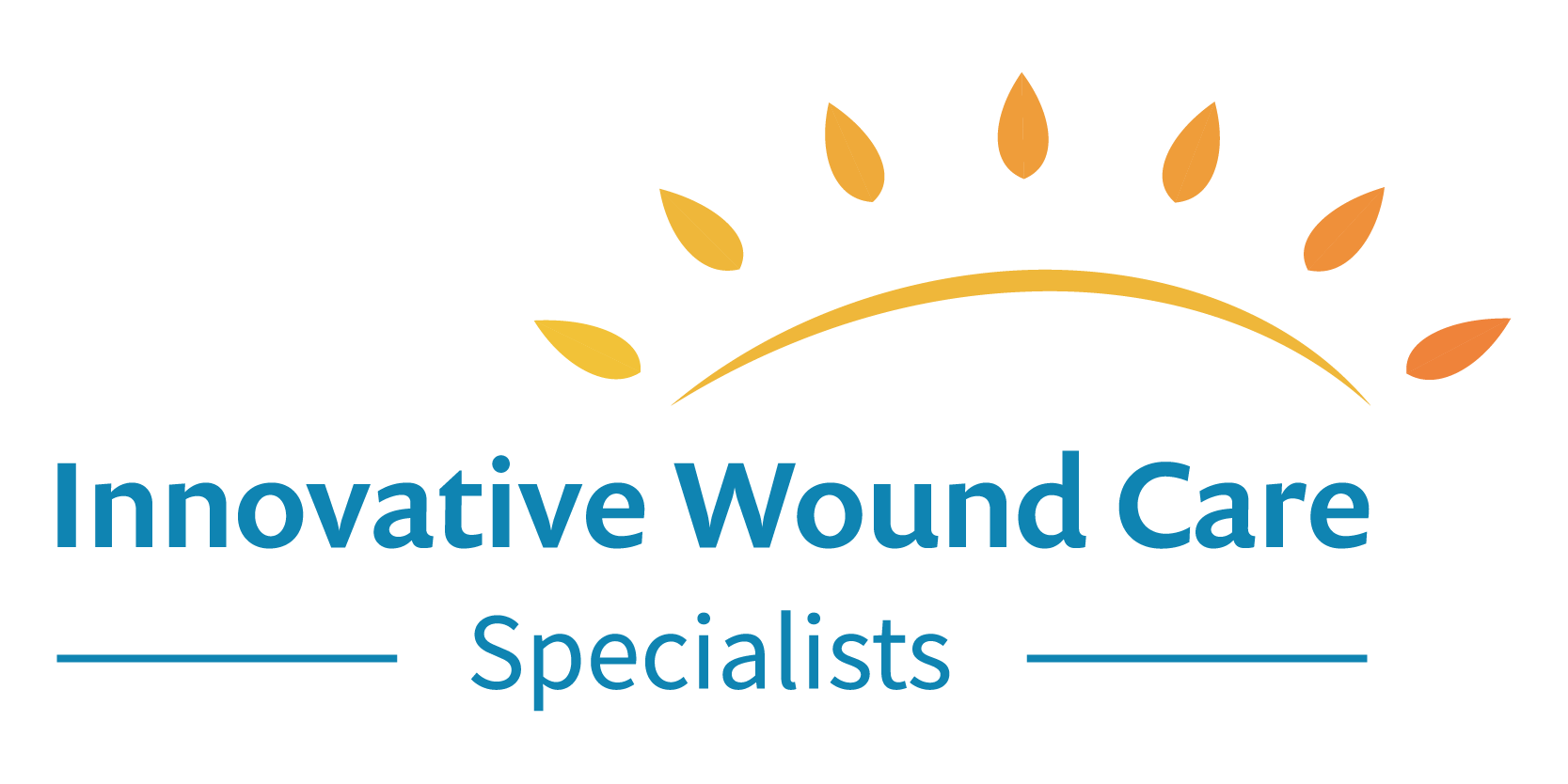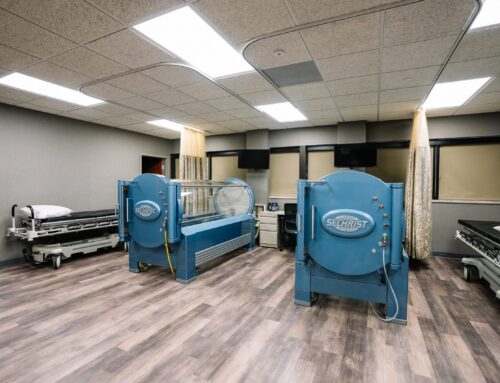When February comes around each year, stores flood with tons of heart-shaped products for Valentine’s day, but this month is for more than just heart-shaped chocolates. February is American Heart Month, an entire month dedicated to raising awareness and educating Americans about the importance of heart health in your daily life. Heart disease plays a significant role in how your body functions, including healing from different types of wounds. Let’s explore how cardiovascular health plays a role in chronic wound healing, and how you can improve your heart health.
Understanding Chronic Wounds
Chronic wounds are wounds that fail to heal within 4 to 12 weeks with treatment. There are many types of chronic wounds, including:
- Diabetic and neuropathic ulcers
- Pressure injuries
- Venous stasis ulcers
- Lower extremity edema
- Trauma wounds
- Minor burns
Any wound can become a chronic wound due to infection, poor circulation, malnutrition, and other underlying conditions. When a wound remains open for an extended period of time, it has increased risk of infection, necrosis, and pain. To prevent these wound complications, you should make sure to talk to your doctor about the wound treatment options available to you.
How Heart Disease Impacts Healing

Healing a wound requires resources throughout your body to be rerouted to the site of the trauma. Heart disease can prevent your cardiovascular system from providing the needed support in multiple ways.
1. Reduced Blood Flow
One of the most direct ways that heart disease affects wound healing is through reduced blood flow. Your blood acts as the transportation system for oxygen and nutrients throughout your body, and maintaining efficient blood flow to a wound is essential for wound healing. The cells responsible for repairing tissue need oxygen to regenerate and fight infection. Without adequate circulation, the body’s natural healing processes slow down due to impaired oxygen delivery, and wounds become more prone to infection or complications.
Heart disease can greatly impact how much blood flow your wounds receive. Conditions like PAD, where the arteries become narrowed or blocked, limit the amount of blood that can reach the tissues in your arms, legs, and feet. If you are in heart failure, the strain on your circulatory system can cause your blood to stagnate and further delay your healing.
2. Impaired Immune Response
As a result of your blood flow decreasing, your wound site also suffers from slower white blood cells. Your white blood cells help fight against infections and remove dead cells from the wound site. Without enough white blood cells, your wound is left vulnerable to bacteria. When your immune response is weakened, infections are more likely to lead to complications such as sepsis, gangrene, or cellulitis.
3. Chronic Inflammation and Tissue Damage
Heart disease can wreak havoc on your circulatory system. Many conditions associated with heart disease cause inflammation, such as atherosclerosis, high blood pressure, or diabetes. Normally, inflammation is the initial step in the healing process that signals the immune cells in your body to begin treating your wound.
Chronic inflammation can weaken and damage your veins, which can hinder your body’s healing process by creating more areas to heal. Since your body is already inflamed, your wound can struggle to transition into the proliferative phase of healing, where new tissue and blood vessels grow to close the wound.
The Cycle of Heart Disease and Chronic Wounds

Between chronic wounds and heart disease, a vicious cycle can start to form without medical intervention. Heart conditions affect blood circulation, and poor circulation can lead to chronic wounds like venous stasis ulcers and pressure injuries. In turn, your wounds fail to heal from lack of blood flow and increase the inflammation and risk of infection, both of which adds additional strain on your heart. Your heart then has to fight to keep up with the extra work supporting tissue repair, continuing the cycle.
To give your heart and wounds the best opportunity to heal, talk to your doctor early about wound care options and how to manage your heart disease.
Managing Chronic Wounds in the Context of Heart and Vascular Disease
For those living with heart disease, managing chronic wounds can be particularly challenging, but it’s not impossible. Here are a few tips for improving wound healing:
Adopt Heart-Healthy Habits
To manage both chronic wounds and heart disease, you can examine your current lifestyle and look for avenues where you can make heart-healthy decisions. A balanced diet, rich in fruits, vegetables, whole grains, and lean proteins, can improve circulation and promote overall skin health. You’ll want to limit your salt, sugar, and processed food intake to help reduce inflammation and improve your circulation.
Regular exercise can also help improve your heart health. Prolonged seated periods can cause poor blood flow in your legs and feet, so try and move around every 30-60 minutes. A short walk around your neighborhood each day can help lower your blood pressure and get your blood pumping. If you have mobility limitations due to chronic wounds or other health conditions, you can look into stretches, seated exercises, or light resistance training to get your blood pumping.
You should quit smoking in order to help your healing and reduce the strain on your cardiovascular system. Smoking causes your blood vessels to constrict and reduce blood flow. If you need help quitting, talk to your doctor about what options are available to you, or check out the American Heart Association’s resources online.
Manage Chronic Conditions

Since wound healing can be affected by other chronic conditions, you should take steps to effectively manage any pre-existing conditions you have. For individuals with diabetes and heart disease, managing blood sugar levels is vital to prevent damage to your blood vessels and nerves. Diabetes can also cause diabetic foot ulcers if you don’t properly manage it. You can manage your diabetes by monitoring your glucose levels and following the advice of your doctor. This will not only support overall cardiovascular health but will also enhance the body’s ability to heal wounds.
For patients with high blood pressure or high cholesterol, consult your doctor about what steps you should take to manage these conditions. It is common for blood pressure and cholesterol levels to be managed through medications and lifestyle changes like diet changes, exercise, and stress management.
Prioritize Wound Care
Handling chronic wounds requires proactive efforts in a wound care routine to prevent complications. Keep a close eye on the health of any chronic wounds, particularly for signs of infection, such as increased redness, warmth, or drainage. Early intervention is key to preventing further complications, so seek medical attention immediately if you notice a wound isn’t improving.
Promoting healthy blood flow through exercise, lifestyle changes, and medications prescribed by a doctor is a great way to prioritize your wound care. Compression stockings, for example, can help improve circulation in the lower legs, which may be especially beneficial for individuals with venous disease. You can also try elevating your legs to help reduce swelling and pressure on your wounds.
In many cases, people with heart disease benefit from working with multiple medical professionals, including primary care providers, cardiologists, wound care specialists, and diabetes educators. A multidisciplinary approach can help address both the underlying health conditions and the wound itself.
For chronic wounds, there are advanced wound care options you can explore with our specialists at Innovative Wound Care, including:
- Hyperbaric Oxygen Therapy (HBOT)
- Negative Pressure Wound Therapy (NPWT)
- Compression Dressings
- Debridement
- Advanced Wound Dressings
Take Action This American Heart Month
American Heart Month serves as an important reminder to take proactive steps in caring for our cardiovascular health. For those with existing heart and vascular conditions, taking steps to improve circulation and overall well-being can make a significant difference in how the body responds to injury and how it heals over time.
By spreading awareness of the connections between heart disease and chronic wounds, we can empower individuals to take charge of their health, reduce risks, and ultimately improve quality of life. Whether through lifestyle changes, medical interventions, or simply staying informed, there are many ways to protect the heart—and by extension, the body—from the complications of poor circulation and impaired healing.
At Innovative Wound Care, our providers can properly assess your wound to expedite your healing journey. You should not have to suffer in silence when you have options available to treat and manage chronic wounds.
Contact us today to learn more about our options, and the next steps you can take for further healing. This February, take time to check in with your heart—and your wounds. Your health is worth it!





